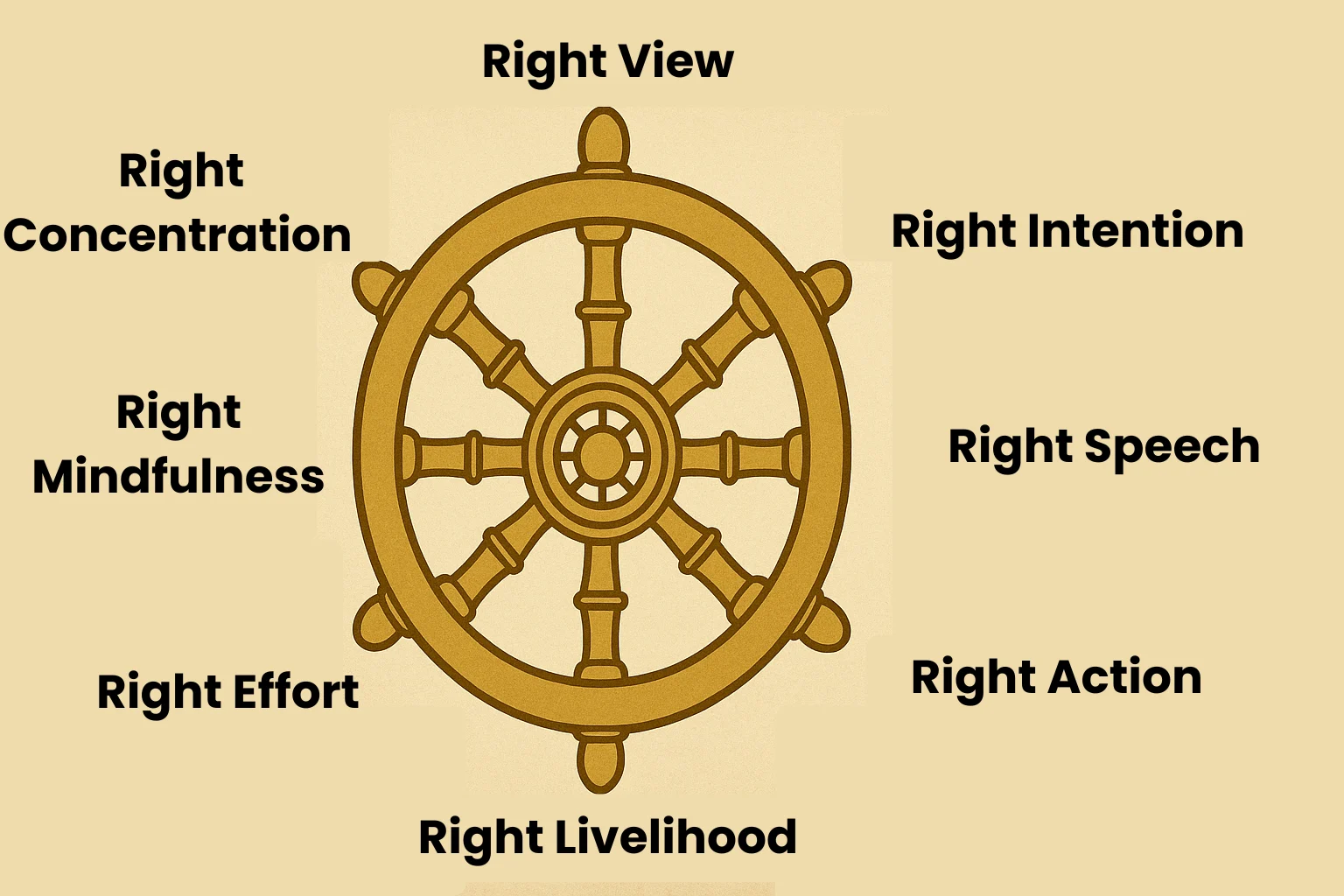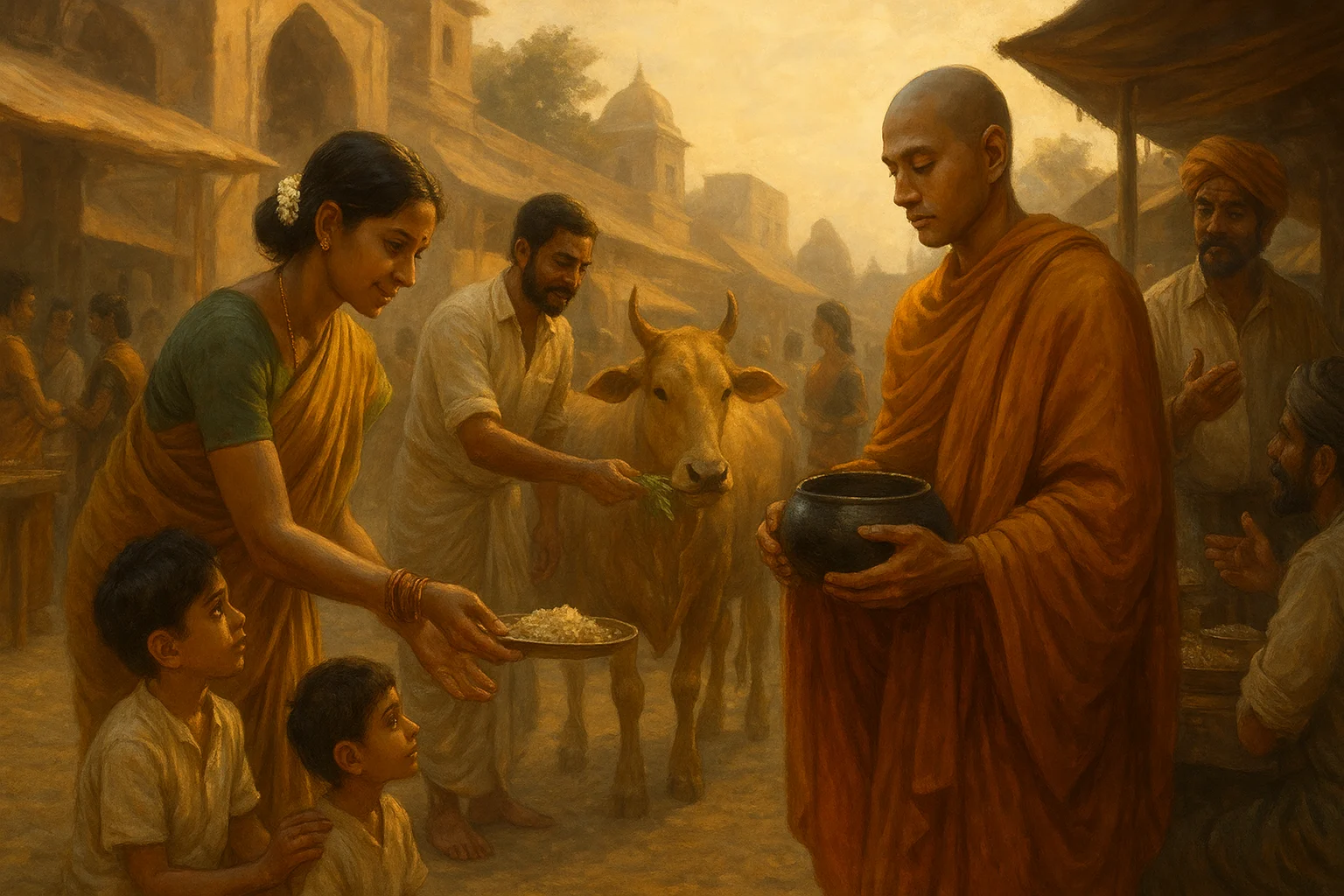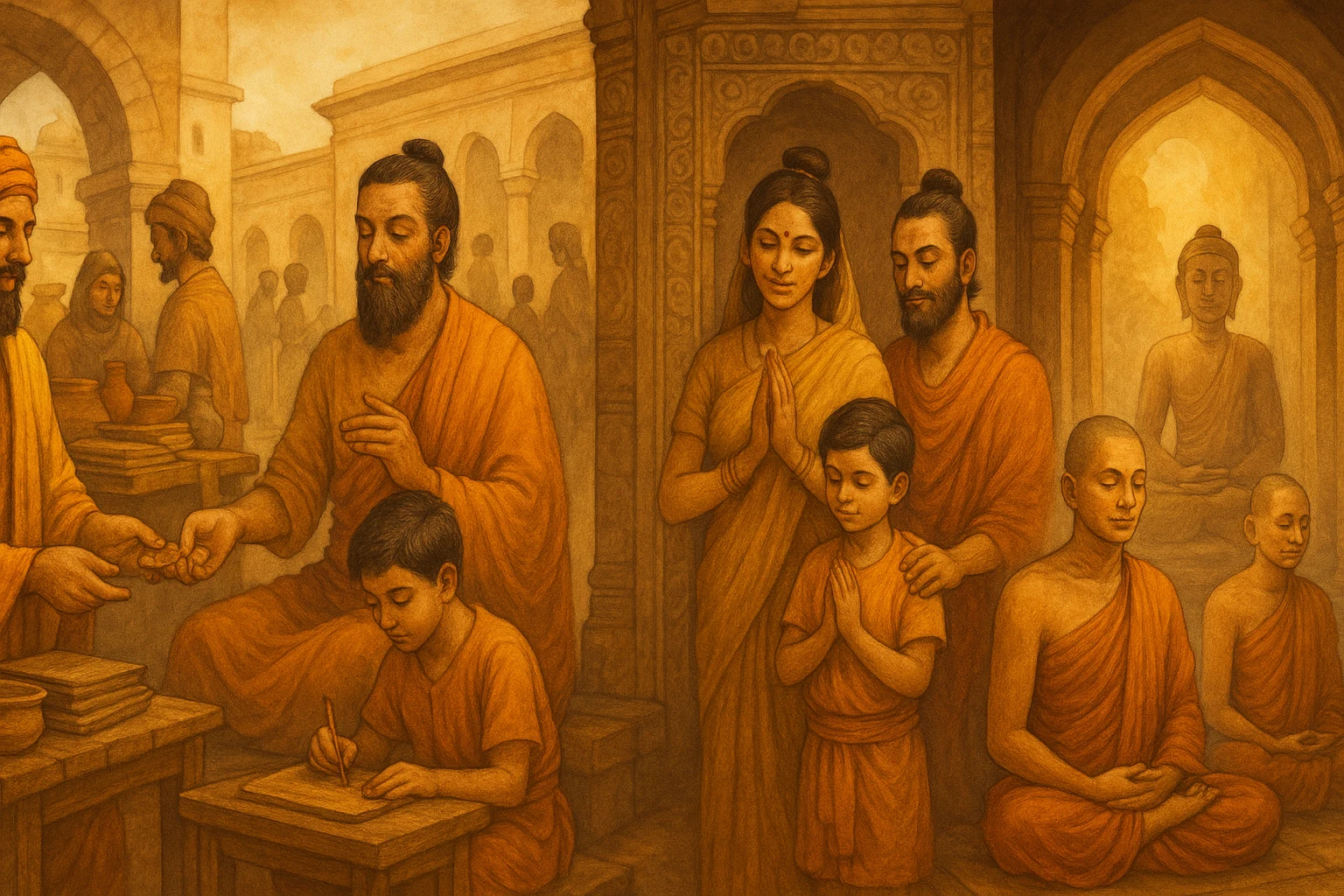Introduction
Indian civilization is one of the oldest in the world, marked by the interweaving of philosophical traditions, cultural practices, and social structures. Among the most significant contributions to India’s moral and spiritual framework is Buddhism, founded by Siddhartha Gautama, popularly known as the Buddha, in the 6th century BCE. Central to Buddhist philosophy is the Noble Eightfold Path, a guide to ethical living, mental discipline, and spiritual progress.
This article explores the Eightfold Path in detail and examines its profound impact on Indian society—its values, ethics, social practices, governance, education, and even modern thought.

Understanding the Eightfold Path
The Noble Eightfold Path is the fourth truth of the Four Noble Truths, which outline the nature of suffering (dukkha), its origin, its cessation, and the way to liberation. It is not a linear path but a holistic way of life where each element complements the other.
The Eightfold Path is divided into three categories:
- Wisdom (Prajñā)
- Right View
- Right Intention
- Ethical Conduct (Śīla)
- Right Speech
- Right Action
- Right Livelihood
- Mental Discipline (Samādhi)
- Right Effort
- Right Mindfulness
- Right Concentration

Let us understand each in detail before connecting it to Indian society.
1. Right View (Sammā Ditthi)
Right View refers to understanding reality as it truly is—recognizing the impermanent nature of existence and the law of karma. It emphasizes wisdom over blind faith.
Impact on Indian Society:
- Encouraged rational thinking and questioning of rituals.
- Helped spread the idea that caste and birth do not determine destiny—actions (karma) do.
2. Right Intention (Sammā Sankappa)
This principle emphasizes cultivating intentions of non-greed, non-hatred, and non-delusion.
Impact on Indian Society:
- Promoted compassion and non-violence (ahimsa).
- Inspired reform movements against societal exploitation and cruelty.
3. Right Speech (Sammā Vācā)
Avoiding lies, harsh words, gossip, and idle chatter forms the core of Right Speech.
Impact on Indian Society:
- Encouraged truthfulness in governance, law, and family relationships.
- Influenced the Indian concept of satya (truth) later adopted by reformers like Mahatma Gandhi.
4. Right Action (Sammā Kammanta)
This relates to ethical conduct—avoiding killing, stealing, and sexual misconduct.
Impact on Indian Society:
- Supported vegetarianism and compassion toward animals.
- Strengthened principles of honesty and responsibility in communities.

5. Right Livelihood (Sammā Ājīva)
Earning a living without harming others is emphasized here. Professions like trading in weapons, intoxicants, or slavery were discouraged.
Impact on Indian Society:
- Created ethical business practices in ancient trade guilds.
- Influenced occupational ethics, encouraging sustainable and fair livelihoods.
6. Right Effort (Sammā Vāyāma)
This principle stresses removing unwholesome thoughts and cultivating positive states of mind.
Impact on Indian Society:
- Strengthened discipline in education and meditation practices.
- Influenced yogic traditions of self-mastery.
7. Right Mindfulness (Sammā Sati)
Mindfulness means being aware of body, feelings, mind, and phenomena.
Impact on Indian Society:
- Inspired meditative traditions like Vipassana and Yoga.
- Encouraged balance in daily living—work, family, and spirituality.
8. Right Concentration (Sammā Samādhi)
This is the practice of deep meditation leading to higher states of consciousness.
Impact on Indian Society:
- Fostered India’s spiritual reputation as a land of meditation.
- Shaped monasteries (vihāras) as centers of meditation and learning.

Broader Influence on Indian Society
1. Social Equality and Caste
Buddhism challenged rigid caste divisions by emphasizing that one’s karma, not birth, defined worth. Many from lower castes embraced Buddhism, making it a powerful social reform movement.
2. Governance and Politics
Buddhist values influenced rulers like Emperor Ashoka, who after the Kalinga war, adopted the Eightfold Path in governance. He promoted tolerance, welfare, and dharma-inspired rule.
3. Education and Monastic Institutions
Buddhist monasteries like Nalanda and Vikramashila became centers of knowledge. They integrated ethics and meditation with intellectual study, influencing India’s educational heritage.
4. Art and Architecture
Stupas, rock-cut caves, and paintings at Ajanta and Ellora were inspired by Buddhist principles of simplicity, non-violence, and spiritual symbolism.
5. Daily Ethics and Family Life
The Eightfold Path’s emphasis on truth, compassion, and mindfulness shaped interpersonal relationships and community ethics across India.
6. Influence on Other Religions
Hinduism and Jainism absorbed aspects of Buddhist ethics—ahimsa, meditation, and equality—creating a lasting synthesis in Indian spirituality.

The Eightfold Path in Modern Indian Society
1. Spiritual Practices Today
- Vipassana meditation (re-popularized by S.N. Goenka) is practiced widely in India.
- Mindfulness is integrated into schools, therapy, and wellness programs.
2. Social Movements
- B.R. Ambedkar embraced Buddhism to fight caste discrimination, inspiring Dalit movements.
- Modern reformers highlight Buddhist ethics to address corruption and inequality.
3. Corporate and Professional Ethics
The principle of Right Livelihood guides responsible business practices, promoting sustainability and corporate social responsibility in modern India.
4. Governance and Law
The Indian Constitution reflects Buddhist influence through equality, justice, and non-discrimination.
5. Everyday Life
Mindfulness and compassion continue to influence lifestyle choices—vegetarianism, yoga, and sustainable living.

Challenges in Applying the Eightfold Path Today
- Consumerism often conflicts with Right Livelihood and Right Intention.
- Political polarization challenges the spirit of compassion and equality.
- Urbanization and modern stress make mindfulness harder to practice.
Conclusion
The Buddhist Eightfold Path is not just a spiritual guide but also a timeless social philosophy. In ancient India, it redefined ethics, governance, and equality; in modern times, it remains a source of guidance for sustainable living, mindful governance, and social harmony.
By weaving wisdom, morality, and discipline, the Eightfold Path has left an indelible imprint on Indian society—past, present, and future.
Receive Stories and Articles in your Inbox!
We won’t send any promotional or spam emails.





















































